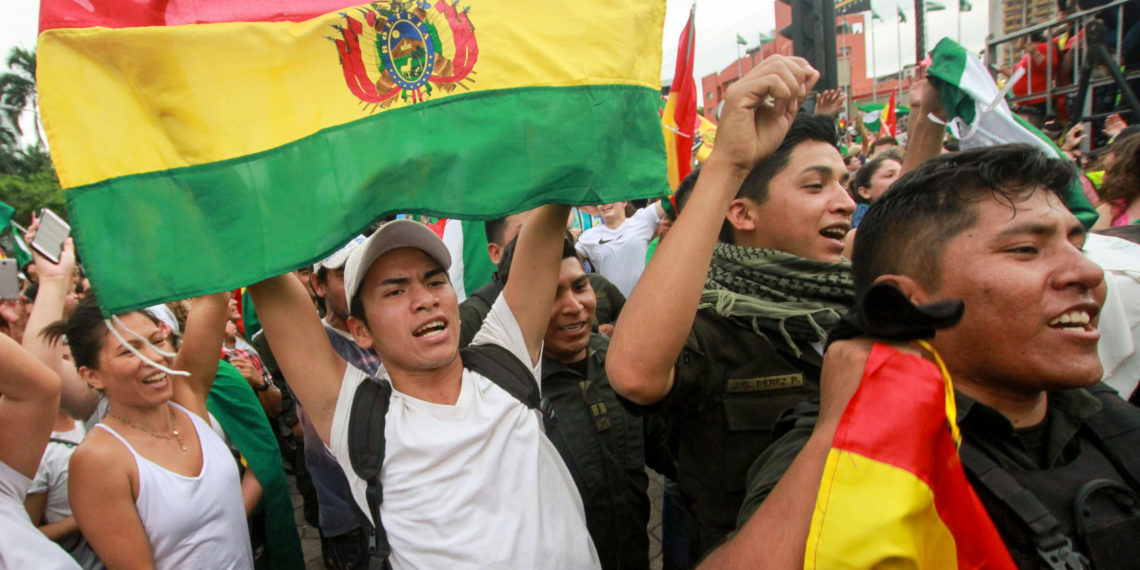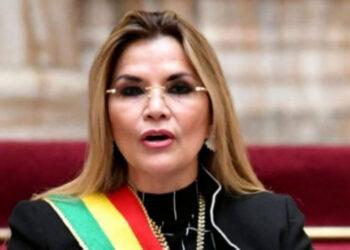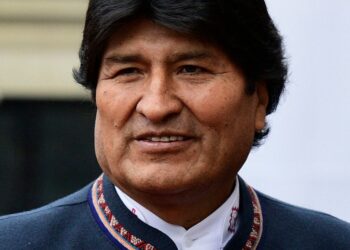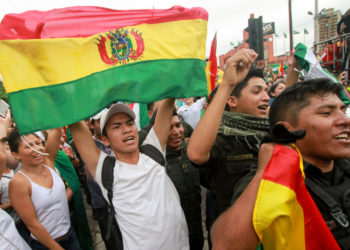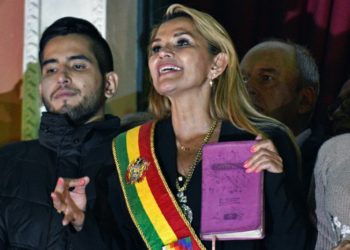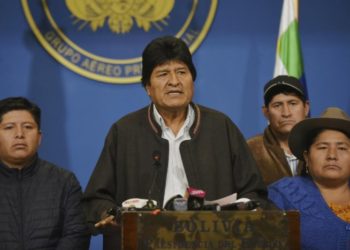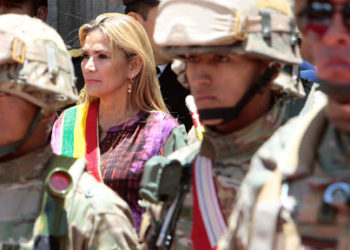Bolivian President Evo Morales’ resignation from office on November 10 followed weeks of sustained popular protests. The military had asked the president to step aside, and he and his supporters cried coup d’etat. While his ouster had the trappings of a coup, appearances can be deceiving.
My research, co-authored with Harold Trinkunas, strongly suggests that although the military’s actions were undoubtedly political, they could be better described as an exercise in self-restraint and preservation rather than coup-like aggression. Their goal was to avoid being placed in the unenviable position of propping up a disgraced leader by cracking down on an angry and determined public.
Bolivia’s Elections
The military’s request capped off three weeks of mass, popular protest against the government suspected of committing electoral fraud in the general election of October 20. Early returns suggested the race between Morales and his challenger, Carlos Mesa, was close enough to force a runoff.
A coup d'état in #Bolivia?
Yes. When they tried to steal the elections of October 20 and perpetuate @evoespueblo in power.
Part 1 of the speech of Secretary General @Almagro_OEA2015 to the #OAS Permanent Council. #OEAenBolivia pic.twitter.com/UBvmQklbqn— OAS (@OAS_official) November 12, 2019
Then, the electoral tribunal – whose members were hand-picked by Morales loyalists – shut the unofficial quick vote count down for 24 hours, only to reopen it by announcing that the president had a commanding lead. The Organization of American States found irregularities in the computing of some 350,000 votes, enough to question the results’ validity.
When Morales suggested he might be a candidate in new elections, the military advised him to step aside. Were Morales to have remained in office, he would have cast serious doubts about the legitimacy of a renewed electoral process.
Familiar Pattern
The Bolivian military’s moves were consistent with patterns observed elsewhere: an incumbent declares victory following an election, but exit polling or independent tallies indicate the results may have been rigged; protests swell, demanding the president’s ouster; instead the besieged president calls upon the military to defend him and intervene to repress the demonstrators; fearing that they will be blamed for causing civilian casualties, the armed forces refuse; shortly thereafter, the president resigns, and new elections are called for.
This course of events is familiar and has played out in other countries too.
For example, Georgia’s 2003 Rose Revolution was set off by substantiated charges of electoral fraud at the hands of the ruling party’s electoral commission. President Eduard Shevardnadze declared emergency rule, hoping the military would silence the protesters that threatened his hold on power. However, the military refused and instead remained in the barracks. Shevardnadze immediately resigned.
The following year, Ukraine had its own revolts, and the parallels with Bolivia are even more striking. An independent vote tally found that the challenger had won handily. But the Central Election Commission went silent for three days, only to re-emerge by pronouncing that the race was practically a dead heat, forcing a runoff. When the government tampered with second-round results, some 1 million Ukrainians exploded in protest. Here too, the military refused to crack down, paving the way for new elections.
Though precipitating conditions were different in Tunisia’s 2011 uprising, the armed forces refused to crush mass protests against the incumbent, Zine El Abidine Ben Ali, which brought about his fall.
And Ecuadorian, Peruvian, and Argentine leaders have been ousted from power for various reasons when their militaries refused to come to their aide in the face of mass civilian uprisings.
Military’s Considerations
Research also shows that all these military reactions are driven by “powerful instincts for self-protection” rather than a desire for political power. The military understands that if its intervention to quell street protests ends up spilling blood, it will likely be blamed rather than the politicians who ordered their deployment. Reprisals will follow. The armed forces want to resolve the crisis in a way that removes them from the front lines of confrontation and future condemnation.
The Bolivian armed forces know these truths all too well. In September 2003, massive protests occurred when the Bolivian government announced plans to export unprocessed natural gas through Chilean ports. Aside from aversions to dependence on the port facilities of a historic adversary, critics also argued the nation would get the short end of the gas pipeline deal because it would receive less revenue for exporting unrefined gas.
Protesters called for policy change, but the administration dug in its heels, sending the armed forces out to suppress the uprising. When the dust settled, 80 civilians lie dead, with hundreds more wounded. The military would pay a heavy price for its repression when, in 2006, the newly elected president Morales purged the senior ranks of all those officers who held command positions during the crackdown. And while President Sánchez de Lozada escaped prosecution by fleeing into exile, the Bolivian Supreme Court convicted and sent to prison four generals and an admiral for their role in the killings.

These events have been a stain on the military’s reputation ever since and explain its fierce determination to avoid a similar fate today. It drove their decision not to repress the protests of recent weeks and motivated their request that President Morales resign. Is that a coup? The term is historically and politically freighted, conjuring up the darkest notions of an unforgivable act that can bring nothing but doom to a democracy. It imposes the full burden on the armed forces themselves, rather than on the politician who led the nation to crisis. Blaming the military for this unfortunate set of events would be a huge mistake.
Instead, it is better to see Morales’ removal as the logical conclusion to a sequence of events that triggered massive popular revulsion and protests over electoral irregularities that he himself precipitated. Whereas coup instigators typically seize the reins of power, the Bolivian armed forces have refrained from doing so, despite the political vacuum that now exists. Instead, they are leaving it to civilian politicians to sort things out. It remains to be seen whether Bolivians can rise to the occasion, restoring integrity to the democratic process.
Disclaimer: The views and opinions expressed here are those of the author and do not necessarily reflect the editorial position of The Globe Post.

